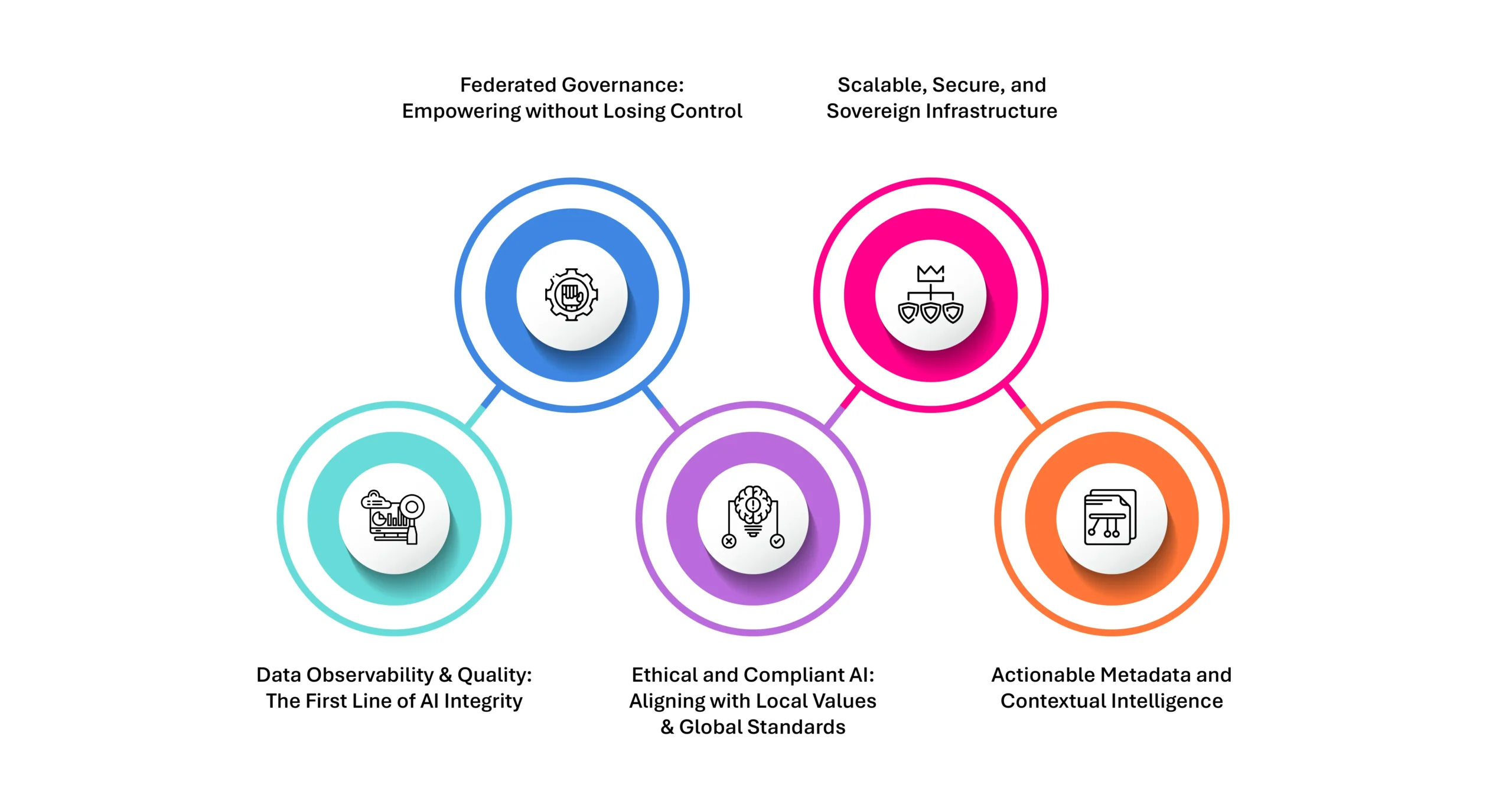Across the Middle East, digital transformation is no longer a buzzword—it’s embedded in national strategy. From Saudi Arabia’s Vision 2030 to the UAE’s Centennial 2071, governments are leading the charge toward AI-driven economies, smart cities, and data-first public services. The private sector is following suit, with ambitious targets for AI integration, cloud migration, and cross-border digital collaboration.
But here’s the challenge: while enterprises are rushing to implement AI, many are skipping the foundational question—is their data infrastructure ready to support it?
According to IDC, AI spending in the Middle East and Africa is projected to hit $14.6 billion by 2028, growing at a compound annual growth rate (CAGR) of 34%. Yet, IBM’s survey shows that 80% of enterprises still struggle with fragmented data ecosystems, which in turn derail AI execution.
CIOs and CDOs are now at a strategic crossroads. This isn’t just about digitization—it’s about intelligent transformation, where AI becomes a core operational layer. But without clean, contextualized, and compliant data, AI becomes not a solution, but a liability.
The Reality Check: AI Failure Is a Data Problem, Not a Technology Problem
For many organizations, AI projects start with excitement and end in disillusionment. A model is built, but the results are either inaccurate, biased, or non-actionable. The problem is not the algorithm but the data.
Gartner estimates that 85% of multi-step AI initiatives fail due to data-related issues, poor quality, and lack of traceability. These failures are even more pronounced in the Middle East, where legacy systems, rapid cloud adoption, and emerging data laws collide to create a perfect storm.
AI models are only as good as the data they ingest. And if that data is siloed, poorly classified, or non-compliant with evolving regional regulations, the risks multiply, spanning reputational damage, customer distrust, and legal exposure.
Strategic Foundations for AI-Ready Enterprises in the Middle East

To avoid these pitfalls and unlock AI’s full potential, enterprises in the Middle East must prioritize five strategic pillars—each tailored to the region’s unique mix of growth, regulation, and ambition.
1. Data Observability and Quality: The First Line of AI Integrity
Unstructured data now accounts for over 80% of enterprise information—from emails and PDFs to IoT streams and social media inputs. In sectors like healthcare, oil and gas, and fintech, this data is often mission-critical.
And yet, most organizations lack real-time observability into their data estates.
What’s needed: AI-powered observability platforms that continuously monitor data quality, detect anomalies, trace lineage, and highlight hidden risk, before that data flows into AI systems.
2. Federated Governance: Empowering without Losing Control
The centralized data governance models of the past no longer scale in today’s decentralized, multi-cloud Middle Eastern enterprises.
With data stored across on-premises infrastructure, regional cloud providers, and sovereign environments, trying to control it all from one command center slows down innovation.
What’s needed: Federated governance allows each business unit or country operation to manage its data, with defined policies, accountability, and controls, while central IT maintains visibility and compliance oversight.
This is especially vital as countries like Saudi Arabia and the UAE enforce strict data residency and cross-border flow regulations, requiring local control with regional alignment.
3. Ethical and Compliant AI: Aligning with Local Values and Global Standards
In a region deeply rooted in cultural, ethical, and religious principles, AI must not only be effective but also responsible.
The UAE was one of the first countries to appoint a Minister of AI. Saudi Arabia’s National Data Management Office (NDMO) now governs how data and AI systems are managed ethically. Across the board, there’s a rising emphasis on privacy, transparency, and purpose-driven innovation.
What’s needed: AI systems that include built-in consent tracking, explainable outputs, and clear audit trails. CIOs and CDOs must ensure that models are not just performing well, but that stakeholders understand how and why those decisions are being made.
This is particularly critical in sectors like public healthcare, finance, and national infrastructure, where trust is non-negotiable.
4. Scalable, Secure, and Sovereign Infrastructure
AI workloads aren’t just heavy—they’re dynamic. Real-time inferencing, edge deployments, and data-hungry models require compute elasticity, high-throughput networking, and secure integration across environments.
But in MENA, infrastructure must also be:
- Compliant with local data protection laws
- Supportive of sovereign cloud adoption
- Hardened against rising cyber threats
In 2023, the Middle East saw a 38% year-over-year increase in cyberattacks. This makes Zero Trust architecture, automated encryption, and access controls essential for any AI-ready infrastructure.
What’s needed: Hybrid and multi-cloud platforms that support containerized applications, integrate intelligent tiering, and ensure security by default, not by retrofit.
5. Actionable Metadata and Contextual Intelligence
The final, often overlooked layer is metadata. Knowing what your data is—who owns it, where it resides, how it’s used—is foundational to AI success.
In the Middle East, with multilingual datasets, cultural sensitivities, and cross-border operations, contextual intelligence becomes even more crucial.
What’s needed: Metadata-rich systems that tag and classify data in real time, highlight regulatory exposure, and provide governance teams with full transparency into data movement, usage, and risk.
Software like Zubin is enabling enterprises to do just that—by automating the classification, policy enforcement, and risk remediation of unstructured data across petabyte-scale environments.
The Role of CIOs and CDOs: From Architects to Orchestrators
In the MENA region, CIOs and CDOs are no longer siloed leaders. They are becoming the strategic orchestrators of enterprise intelligence, building bridges between IT, compliance, risk, innovation, and business units.
Their mandate is clear:
- Lead the transformation of data into a business asset
- Architect AI-ready foundations with privacy, security, and ethics at the core
- Align with national regulatory frameworks and sector-specific mandates
- Empower business users with self-service tools for data discovery, access, and governance
The decisions made now will define the AI trajectory of the enterprise—and the nation.
In a region known for bold ambition, technological adoption, and fast-paced innovation, the Middle East is poised to become a global AI leader. But leadership doesn’t come from deploying more models—it comes from deploying them responsibly, transparently, and strategically.
AI-readiness is not a buzzword. It’s an operational blueprint.
For CIOs and CDOs navigating AI transformation in the Middle East, success depends on one foundational element: a unified view of enterprise data. In a region marked by data sprawl, regulatory nuance, and rapid digital ambition, fragmented systems can’t deliver the trust, transparency, or speed that modern AI demands.
That’s where Zubin steps in—bringing together metadata intelligence, automated classification, federated governance, and self-service access into one cohesive framework. It eliminates silos, aligns compliance with action, and empowers both CIOs and CDOs to lead with confidence.
From securing sensitive data and meeting sovereignty mandates to powering scalable, AI-ready ecosystems, Zubin helps organizations move from chaos to clarity. It’s not just infrastructure. It’s insight, control, and a strategic edge. To know more about Zubin and try it firsthand, visit – https://www.datadynamicsinc.com/
Sources:
- AI spending in the Middle East and Africa is projected to hit $14.6 billion by 2028, growing at a compound annual growth rate (CAGR) of 34%.
- 80% of enterprises still struggle with fragmented data ecosystems, which in turn derail AI execution.
- 85% of multi-step AI initiatives fail due to data-related issues, poor quality, and lack of traceability.
- In 2023, the Middle East saw a 38% year-over-year increase in cyberattacks.






